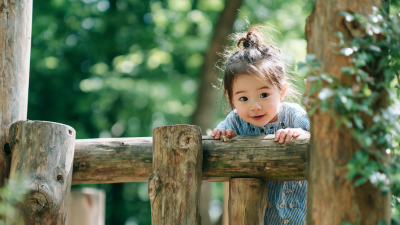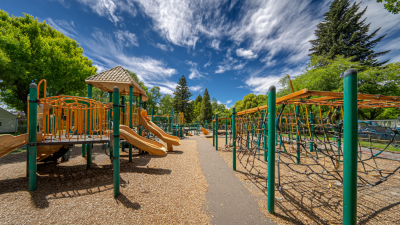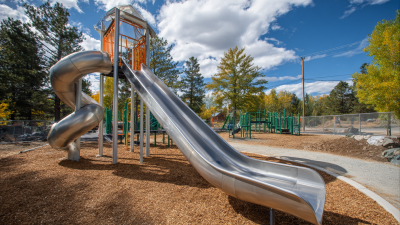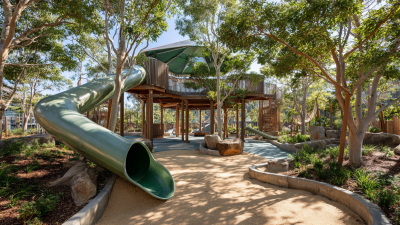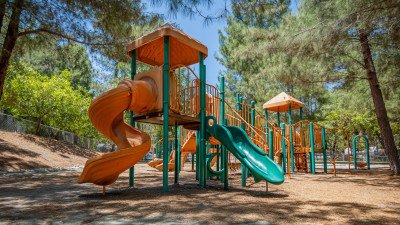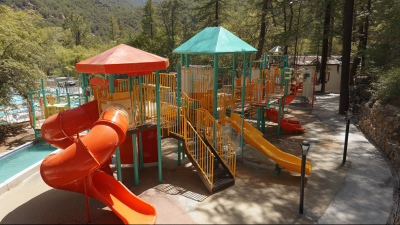 +86-13901441113
+86-13901441113




In recent years, the importance of "Outdoor Play Slides" as a fundamental component of childhood development has gained significant attention from educators and psychologists alike. Studies indicate that outdoor play can enhance children’s physical health, with the American Heart Association noting that just 60 minutes of active play daily can significantly improve cardiovascular fitness in children. Furthermore, research published by the American Academy of Pediatrics highlights that outdoor play promotes social skills, reduces stress, and improves emotional resilience. Engaging in activities like sliding and climbing helps children develop crucial motor skills, while also providing opportunities for imaginative play and social interaction. As we explore the surprising benefits of outdoor play slides, it becomes clear that these seemingly simple structures hold the potential to unlock a wealth of joy and developmental advantages for children, fostering both their physical prowess and emotional well-being.

Outdoor play slides are not just a source of fun; they hold significant physical benefits for children’s development. Climbing up and down slides enhances their coordination, balance, and strength. As children navigate the incline, they engage multiple muscle groups, promoting overall fitness and endurance. This playful activity also encourages them to develop gross motor skills, essential for everyday tasks and physical activities.
To maximize the benefits of outdoor play slides, parents can incorporate a few simple tips. First, encourage children to use slides as part of a larger obstacle course, integrating activities such as running, jumping, and crawling. This not only improves their cardiovascular fitness but also increases their agility and spatial awareness. Additionally, consider organizing playful competitions with friends, fostering a sense of community and teamwork while encouraging physical exertion.
Another tip is to schedule regular outdoor playdates, ensuring children have ample opportunities for active play. Keeping the play environment safe and engaging is key—add colorful mats or soft grass around slides to prevent injuries and create a vibrant play area. By promoting outdoor play, we help nurture not just healthier bodies but also happier, more resilient children.
| Benefit Type | Specific Benefits | Age Group | Frequency of Use |
|---|---|---|---|
| Physical Development | Improved balance and coordination | 3 to 5 years | Daily |
| Emotional Development | Boosts confidence and self-esteem | 4 to 7 years | Several times a week |
| Social Development | Encourages teamwork and sharing | 5 to 8 years | Weekly |
| Cognitive Development | Enhances problem-solving skills | 5 to 10 years | Weekly |
| Physical Fitness | Promotes cardiovascular health | All ages | Daily |
 Outdoor play, particularly slide play, plays a crucial role in nurturing children's emotional well-being. Research indicates that engaging in play fosters a range of positive emotional outcomes, including reduced stress and increased feelings of joy and belonging. According to a 2019 study published in the Journal of Play, children who spend time in outdoor play environments show significantly lower levels of anxiety and depression compared to those who favor indoor activities. The act of climbing up to a slide and descending can instill a sense of accomplishment and freedom, promoting self-esteem and resilience.
Outdoor play, particularly slide play, plays a crucial role in nurturing children's emotional well-being. Research indicates that engaging in play fosters a range of positive emotional outcomes, including reduced stress and increased feelings of joy and belonging. According to a 2019 study published in the Journal of Play, children who spend time in outdoor play environments show significantly lower levels of anxiety and depression compared to those who favor indoor activities. The act of climbing up to a slide and descending can instill a sense of accomplishment and freedom, promoting self-esteem and resilience.
Moreover, the social interactions that occur during slide play contribute to emotional development. As children share slides, they learn critical social skills such as cooperation and conflict resolution. A 2020 report from the American Academy of Pediatrics highlights that children who participate in social play activities often demonstrate improved emotional regulation and empathy towards peers. These interactions not only create lasting friendships but also enhance emotional intelligence, ultimately fostering healthier relationships as they grow. Outdoor play experiences, like using slides, are therefore integral to the holistic development of children's emotional health.
Outdoor play slides are more than just a source of fun; they serve as essential tools for enhancing social skills among children. When kids climb, slide, and interact on playground equipment, they engage in cooperative play, which fosters communication and teamwork. For instance, as they take turns sliding or help each other navigate the structure, they learn to share, negotiate, and resolve conflicts. These interactions are crucial for building friendships and understanding social dynamics.
To maximize these benefits, parents can encourage interactive play by organizing group outings to local parks. Setting up playdates at playgrounds allows children to explore slides together, enhancing their experience through shared laughter and challenges. Additionally, creating simple games that involve sliding—such as relay races or follow-the-leader—can promote collaboration and engagement among peers.
Another effective tip is to teach children about the importance of taking turns. Parents can model this behavior during playtime, showing their kids how to wait patiently and cheer for one another. This not only reinforces patience but also cultivates empathy, helping children appreciate their friends' experiences and feelings on the playground. By nurturing these social interactions, outdoor play slides become vital for emotional development as well as physical activity.

Outdoor play slides are more than just fun attractions at parks; they serve as crucial tools for boosting creativity and imagination in children. When children climb, slide, and play on these structures, they embark on a journey of exploration that stimulates their minds. The act of imagining different scenarios—whether they are soaring through the sky like superheroes or racing down a magical waterfall—invites them to engage in storytelling and role-playing, vital components of creative development.
Furthermore, the open-ended nature of play on slides fosters problem-solving skills. As children navigate their movements and choices on the equipment, they learn to assess risks, develop strategies, and collaborate with peers. This unstructured play encourages them to think outside the box, innovate their play styles, and adapt to new situations. By transforming a simple slide into a world of endless possibilities, children enhance their imaginative capabilities while enjoying the benefits of joyful outdoor experiences.
When it comes to outdoor play, slides are a beloved feature that can bring immense joy to children. However, ensuring safety while kids engage in this exhilarating activity is of utmost importance. To maximize fun while minimizing risks, parents and caregivers should adhere to some best practices. First, always supervise children while they play on slides. This should involve not only watching from a distance, but also engaging with them to ensure they are using the equipment correctly.
Additionally, it's crucial to check the sliding equipment for any defects or wear before use. Ensure that the slide is clean, free of debris, and has no sharp edges that could pose a hazard. Moreover, choose age-appropriate slides and ensure they are set on a soft surface, such as grass or rubber mulch, to cushion any falls. Educating children about the importance of waiting for their turn and not climbing up the slide can help prevent accidents. By implementing these safety measures, we can create a joyful and secure environment where children can thrive emotionally and physically through outdoor play.
